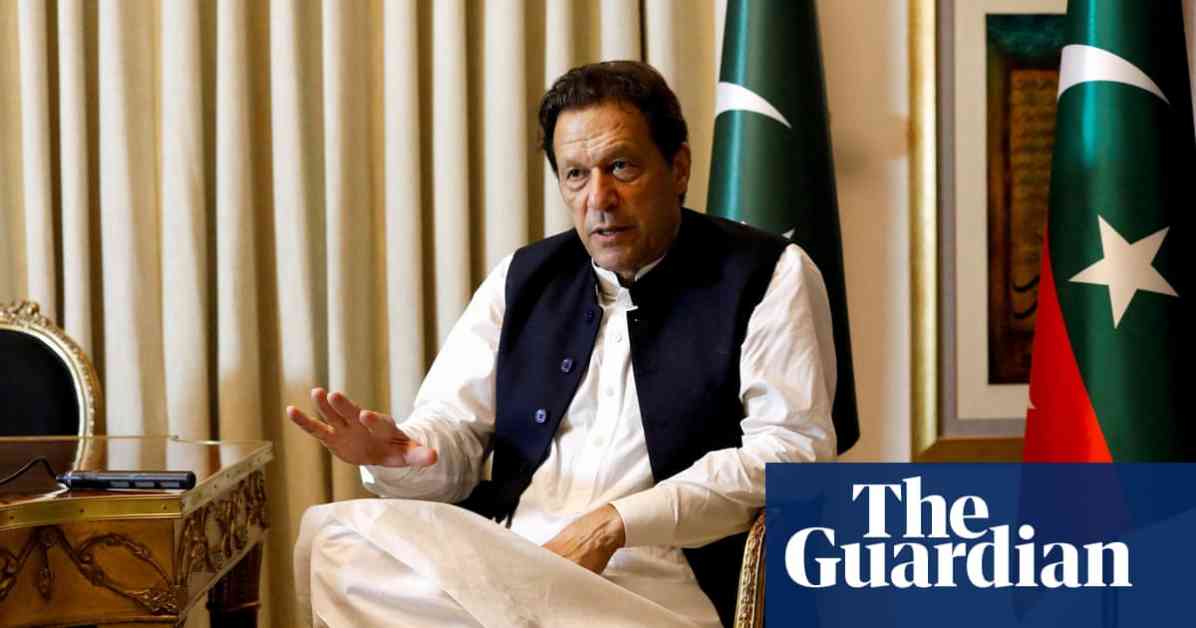Imran Khan, the imprisoned former prime minister of Pakistan, has thrown his hat into the ring to become the next chancellor of Oxford University. This move comes as a surprise to many, considering Khan’s current circumstances as a political prisoner. With the election set to take place later this year, Khan is determined to secure the prestigious position and make his mark on one of the world’s most renowned educational institutions.
Imran Khan’s Aspirations
Syed Zulfi Bukhari, one of Khan’s advisers, confirmed that the former prime minister has officially submitted his application to run in the election scheduled for October. If successful, Khan would replace Chris Patten, the former Conservative minister who currently holds the chancellorship at Oxford. Despite facing numerous legal challenges and being imprisoned for the past year, Khan remains undeterred in his quest for this esteemed position.
Khan’s political career has been tumultuous, to say the least. Serving as Pakistan’s prime minister from 2018 to 2022, he was ultimately ousted through a vote of no confidence orchestrated by the country’s military. Since then, he has been embroiled in legal battles and faced a litany of charges that have landed him behind bars. However, Khan’s supporters believe that his experience as a political leader and his dedication to public service make him a worthy candidate for the role of Oxford chancellor.
In addition to his political achievements, Khan boasts an impressive academic background. He served as chancellor of the University of Bradford for eight years and studied politics, philosophy, and economics at Oxford’s Keble College in the 1970s. During his time at Oxford, Khan also excelled as a member of the university’s cricket team, earning accolades for his sportsmanship and leadership. His experience both in academia and on the field has prepared him well for the responsibilities that come with the position of chancellor.
The Changing Landscape of Oxford Elections
Traditionally, elections for the chancellorship at Oxford University required graduates and staff to be physically present in Oxford and don academic attire to cast their votes. However, recent changes in election protocols have made it easier for candidates like Khan to participate in the electoral process. With nominations and voting now conducted online, candidates can engage with the university community regardless of their location or personal circumstances.
The decision to move the election process online has opened up new opportunities for a diverse range of candidates to enter the race. While overt campaigning is still relatively uncommon, the digital nature of the election has allowed for greater accessibility and transparency in the selection of the next chancellor. This shift reflects Oxford’s commitment to modernizing its governance practices and embracing technological advancements in higher education.
Despite the convenience of online voting, the selection of the next chancellor remains a highly anticipated event within the Oxford community. As nominations closed on Sunday, speculation abounds regarding the potential candidates who will be vying for the prestigious role. While the university has not officially confirmed any individual candidates, the names of several prominent figures have been circulating as likely contenders in the upcoming election.
Rival Candidates and Potential Contenders
Among the speculated candidates for the chancellorship are Elish Angiolini, the former lord advocate of Scotland and principal of St Hugh’s College, and Margaret Casely-Hayford, a former chair of Shakespeare’s Globe. Both Angiolini and Casely-Hayford would make history as the first female chancellor in Oxford’s storied past, marking a significant milestone for the university’s leadership.
In addition to these potential contenders, supporters of former Labour minister Peter Mandelson and former Conservative leader William Hague have expressed interest in the role. The diverse range of candidates reflects the breadth of talent and experience within the Oxford community, highlighting the university’s commitment to fostering a culture of inclusivity and representation in its leadership positions.
As the election date approaches, the spotlight is on the candidates vying for the chancellorship and the vision they bring to the role. While each contender brings a unique set of skills and experiences to the table, the ultimate decision rests in the hands of Oxford’s graduates and academic staff. Their votes will determine the future direction of the university and shape the legacy of the next chancellor for years to come.
The Role of the Chancellor
While the chancellor of Oxford University is primarily a ceremonial position, it carries significant responsibilities and influence within the institution. The chancellor chairs the committee responsible for appointing the vice-chancellor, the university’s chief executive, and plays a key role in fundraising, advocacy, and oversight of the university’s operations. Despite its non-executive nature, the position holds considerable prestige and symbolic importance for Oxford and its stakeholders.
Historically, the role of chancellor has been filled by prominent figures from various backgrounds, including powerful politicians and cultural icons. From Robert Dudley, the first earl of Leicester, during Elizabeth I’s reign, to Oliver Cromwell during his rule as lord protector, the chancellorship has been held by individuals with diverse talents and perspectives. Each chancellor has left a lasting impact on the university and contributed to its rich history and traditions.
As the 159th person to serve as Oxford’s chancellor since 1224, Chris Patten has upheld the traditions of the position and guided the university through a period of growth and change. His successor will inherit a legacy of leadership and stewardship that will shape the future of Oxford and its global reputation. The upcoming election represents a pivotal moment in the university’s history, as candidates vie for the opportunity to lead one of the world’s premier academic institutions.
In conclusion, Imran Khan’s candidacy for the chancellorship of Oxford University marks a significant chapter in the institution’s history. Despite facing numerous challenges and legal hurdles, Khan remains determined to secure the prestigious position and make a meaningful contribution to the university’s future. As the election date approaches, the Oxford community eagerly anticipates the outcome of the vote and the selection of the next chancellor who will guide the institution into a new era of excellence and innovation.

